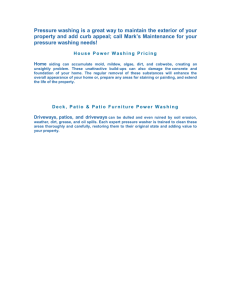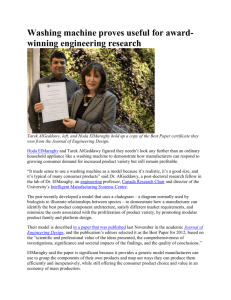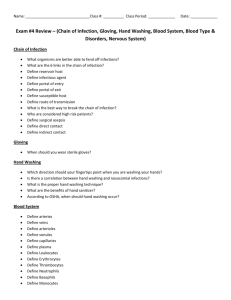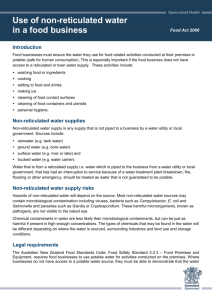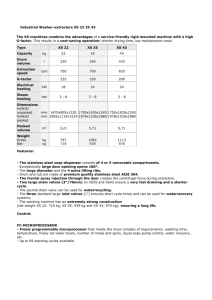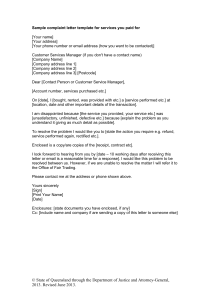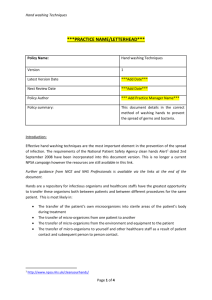operating a food business in the event of a water stoppage
advertisement
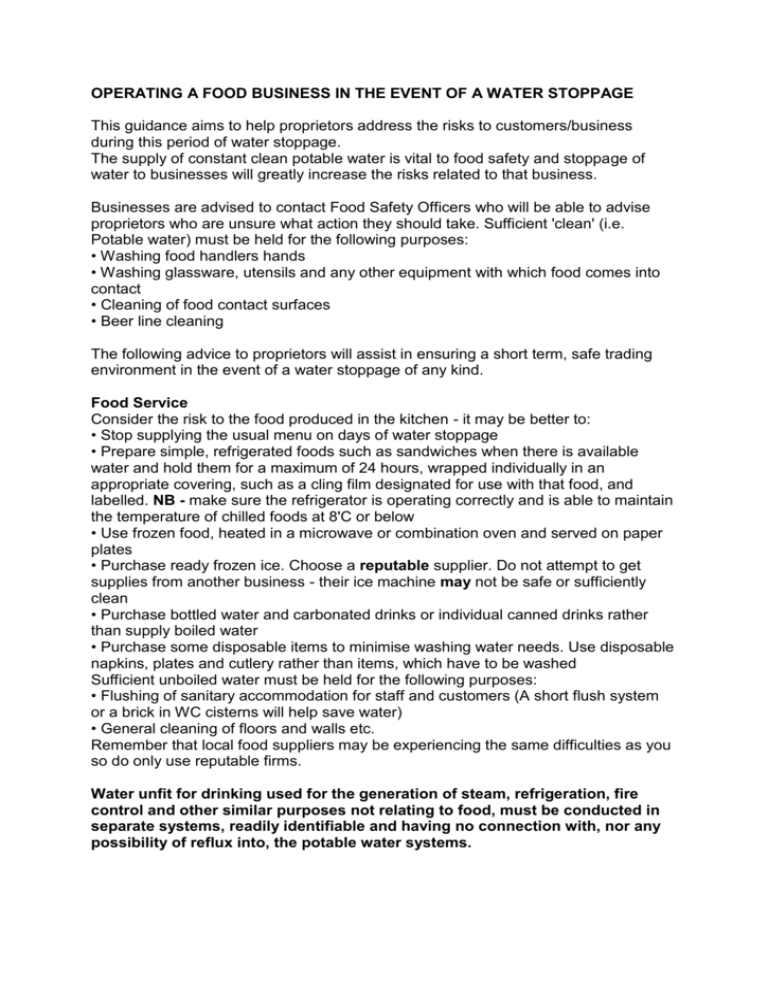
OPERATING A FOOD BUSINESS IN THE EVENT OF A WATER STOPPAGE This guidance aims to help proprietors address the risks to customers/business during this period of water stoppage. The supply of constant clean potable water is vital to food safety and stoppage of water to businesses will greatly increase the risks related to that business. Businesses are advised to contact Food Safety Officers who will be able to advise proprietors who are unsure what action they should take. Sufficient 'clean' (i.e. Potable water) must be held for the following purposes: • Washing food handlers hands • Washing glassware, utensils and any other equipment with which food comes into contact • Cleaning of food contact surfaces • Beer line cleaning The following advice to proprietors will assist in ensuring a short term, safe trading environment in the event of a water stoppage of any kind. Food Service Consider the risk to the food produced in the kitchen - it may be better to: • Stop supplying the usual menu on days of water stoppage • Prepare simple, refrigerated foods such as sandwiches when there is available water and hold them for a maximum of 24 hours, wrapped individually in an appropriate covering, such as a cling film designated for use with that food, and labelled. NB - make sure the refrigerator is operating correctly and is able to maintain the temperature of chilled foods at 8'C or below • Use frozen food, heated in a microwave or combination oven and served on paper plates • Purchase ready frozen ice. Choose a reputable supplier. Do not attempt to get supplies from another business - their ice machine may not be safe or sufficiently clean • Purchase bottled water and carbonated drinks or individual canned drinks rather than supply boiled water • Purchase some disposable items to minimise washing water needs. Use disposable napkins, plates and cutlery rather than items, which have to be washed Sufficient unboiled water must be held for the following purposes: • Flushing of sanitary accommodation for staff and customers (A short flush system or a brick in WC cisterns will help save water) • General cleaning of floors and walls etc. Remember that local food suppliers may be experiencing the same difficulties as you so do only use reputable firms. Water unfit for drinking used for the generation of steam, refrigeration, fire control and other similar purposes not relating to food, must be conducted in separate systems, readily identifiable and having no connection with, nor any possibility of reflux into, the potable water systems. Water Storage Potable water should be kept in clean, capped or lidded containers, away from direct sunlight, in order to prevent algae growth or physical contamination. It is essential that stored water remains clean. The containers of potable water should be kept as cool as possible. Use refrigerators, beer cooling cabinets or chilled cellars for storage. Containers should be properly labelled, and water should not be stored for longer than 24 hours, after which time it may be used for other non-food or drink purposes. Disinfection of Water Any water, which does reach the business from the mains, may have become contaminated by the pipes standing empty, so it must be disinfected appropriately by either boiling it or through chemical means. Boiling Boil water used for washing, cleaning, pipes and drinking once the “switch-off” begins and continue until the all clear is received from the water authority. To boil water safely, heat small manageable quantities. Allow it to cool before decanting it into clean lidded/covered vessels. Do NOT attempt to decant water when it is hot. Boiling all water for potable uses, including hand washing, will not always be practical, in which case chemicals specifically for disinfecting water may be used. Boiled water can be used for hand washing, food and equipment washing and for washing any surfaces, which may come into contact with food. Use of Chemical Methods for Disinfecting If water disinfecting chemicals are used, read the instructions carefully and follow all advice regarding contact times, etc. Chlorine tablets can be used but they will not kill all organisms. The proprietors should always act on the advice of the water company regarding disinfecting and any treatment of piped water, which may be available during and immediately after a period of interrupted supply. This advice may take account of physical or chemical contamination. Where there is any doubt regarding the advice received, proprietors should contact their local food safety officers. Bowser Supply If bowsers are provided, water must be drawn into clean vessels and the supplier may then give instructions to disinfect such water by boiling or by chemical means. This water should not be used for hand washing, food washing or to wash anything which may come into contact with food unless it has been boiled. 'Clean' (potable) water must be kept in clean containers, which are capped or lidded. The containers of potable water should be kept as cool as possible. Use refrigerators, beer cooling cabinets or chilled cellars for storage. Customer Care Put up notices explaining that the action being taken within the business is due to the water stoppages and request customer’s help and understanding.
